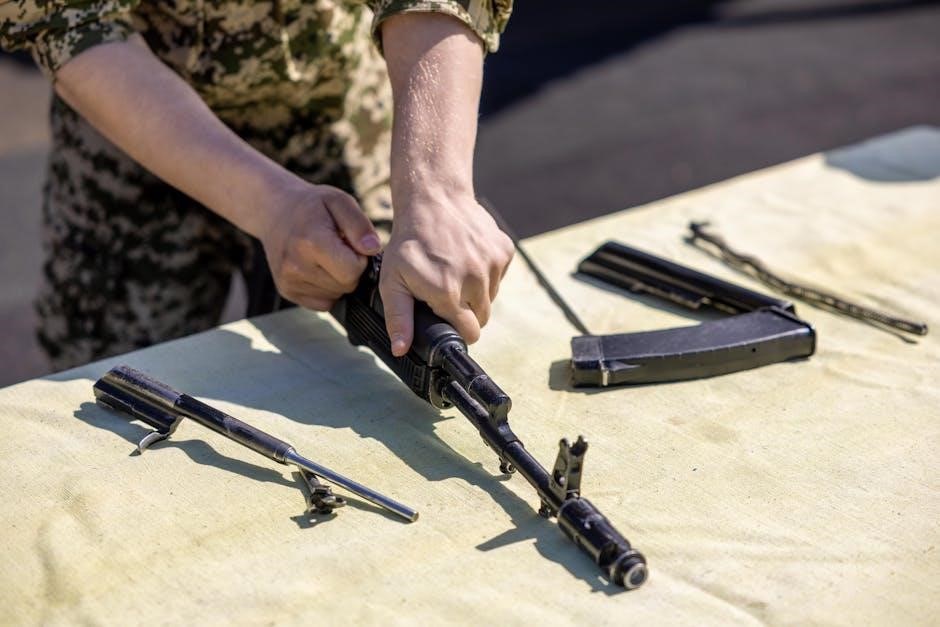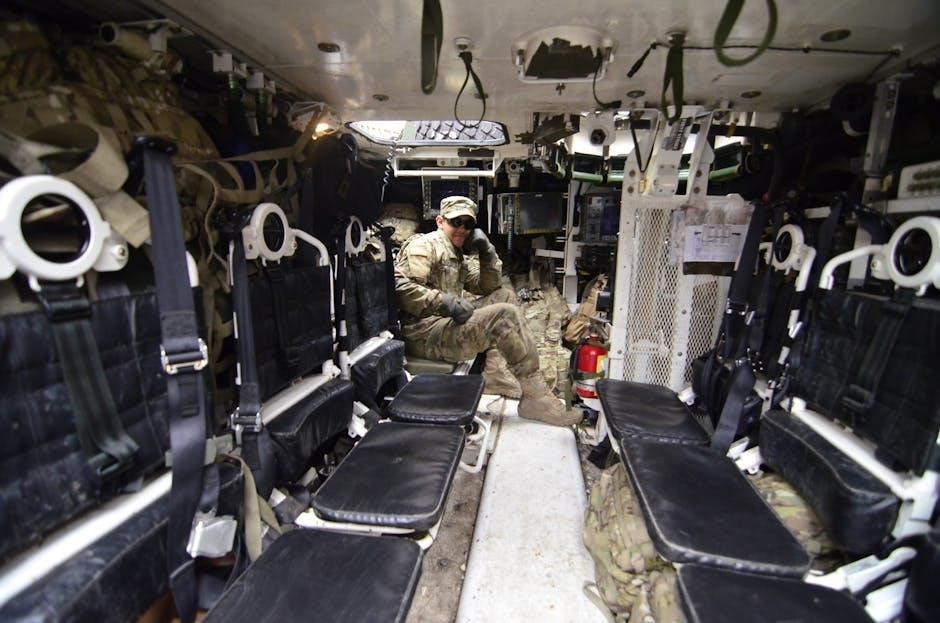The SERE Training Manual provides essential guidelines for military personnel on Survival, Evasion, Resistance, and Escape techniques. It emphasizes hands-on learning through practical exercises and realistic simulations to prepare for isolation scenarios, ensuring adherence to the Code of Conduct.
1.1. Overview of SERE Training
SERE training encompasses a comprehensive program designed to equip military personnel with critical skills in Survival, Evasion, Resistance, and Escape. It integrates theoretical knowledge with practical exercises, focusing on realistic simulations to prepare individuals for isolation scenarios. The curriculum includes survival techniques, evasion strategies, resistance methods, and escape procedures. Trainees learn to adapt to hostile environments, withstand captivity, and maintain the Code of Conduct. The program progresses from basic to advanced levels, ensuring personnel are prepared to return with honor under any circumstances.
1.2. Importance of SERE Training in Modern Military Operations
SERE training is critical in modern military operations, as it prepares personnel to survive and resist in hostile environments. It enhances their ability to evade capture, resist interrogation, and escape captivity, ensuring they return with honor. This training is essential for maintaining operational readiness and safeguarding national security; By fostering resilience and adherence to the Code of Conduct, SERE training ensures service members can withstand isolation and adversity, upholding their commitment to mission and country. Its relevance grows as global conflicts evolve, making it a cornerstone of military preparedness.
Purpose and Scope of the SERE Training Manual

The manual standardizes SERE training procedures, ensuring all service members are prepared to survive isolation effectively. Its scope includes comprehensive curriculum and advanced techniques for diverse scenarios.
2.1. Objectives of the SERE Training Program
The primary objectives of the SERE Training Program are to prepare personnel to survive isolation, evade capture, resist exploitation, and escape safely. It aims to ensure service members can return with honor, adhering to the Code of Conduct. The program focuses on developing practical skills, mental resilience, and ethical decision-making. It also emphasizes the importance of continuity training to maintain readiness throughout a service member’s career, ensuring they are equipped to handle diverse survival scenarios effectively and responsibly. These objectives are achieved through structured, realistic simulations and hands-on exercises.
2.2. Target Audience and Eligibility Criteria
The SERE Training Manual is designed for military personnel at risk of isolation, including aircrew, special operations forces, and others in high-risk roles. Eligibility criteria focus on those deploying to hostile environments or conducting missions with elevated capture risks. The training is mandatory for service members in these roles, ensuring they are prepared to survive and resist captivity. It is tailored to meet the specific needs of diverse operational environments and is part of a career-long training continuum to maintain readiness and adaptability. This ensures all eligible personnel are adequately equipped to face survival challenges.

Phases of SERE Training
The SERE Training Manual is structured into three phases: Survival Skills, Evasion Techniques, and Resistance Strategies. These phases build on each other to enhance readiness and ensure effective response to isolation situations.
3.1. Phase 1: Survival Skills and Techniques
Phase 1 focuses on teaching essential survival skills, such as finding food, building shelters, and navigating diverse environments. Trainees learn to use available resources effectively and adapt to extreme conditions. Practical exercises and simulations emphasize water procurement, fire starting, and signaling techniques. This phase also covers basic first aid and mental resilience strategies to withstand physical and psychological stress. The goal is to equip personnel with the foundational skills needed to sustain life and remain operational until recovery or escape. These skills are critical for isolated personnel in hostile or austere settings.
3.2. Phase 2: Evasion and Escape Methods
Phase 2 trains personnel in advanced evasion and escape techniques to avoid capture. Trainees learn camouflage methods, tracking avoidance, and movement strategies to evade enemy forces. This phase emphasizes the use of evasion plans (EPA) and communication techniques to signal recovery forces. Practical exercises include navigating hostile terrain, using concealment, and executing controlled SERE protocols. Trainees also practice breaking contact with enemy forces and regaining freedom. These skills are essential for isolated personnel to remain undetected and increase chances of successful recovery or escape in survival scenarios.
3.3. Phase 3: Resistance and Interrogation Tactics
Phase 3 focuses on resistance and interrogation tactics to help personnel withstand captivity. Trainees learn techniques to resist exploitation, maintain personal honor, and adhere to the Code of Conduct. This phase includes instruction on psychological resilience, countering interrogation methods, and strategies to provide minimum information; Practical exercises simulate captivity scenarios, teaching participants to endure and resist while preserving critical information. The phase emphasizes ethical conduct and mental strength to survive interrogation and captivity with integrity, aligning with AFI16-1301 policies and international laws of war.
Regulatory Affairs and Policies
This section covers AFI16-1301 policies, governing SERE programs, and ensures compliance with international laws and standards, providing a legal framework for training and operations.

4.1. AFI16-1301: Policies and Procedures for SERE Program

AFI16-1301 outlines the policies and procedures for the U.S. Air Force’s SERE program, ensuring military personnel are trained to survive and return with honor. It covers survival techniques, evasion strategies, resistance methods, and escape procedures, emphasizing adherence to the Code of Conduct. The regulation also addresses preparation for isolation scenarios and compliance with international laws, providing a comprehensive framework for effective SERE operations.
4.2. Compliance with International Laws and Standards

The SERE program adheres to international laws and standards, ensuring humanitarian treatment and ethical conduct. Training aligns with the Geneva Conventions and other global agreements to protect personnel and prevent violations. Emphasis is placed on human rights and the lawful treatment of detainees, reflecting the military’s commitment to moral and legal obligations. Compliance is rigorously monitored to maintain accountability and uphold international norms during survival, evasion, resistance, and escape scenarios.

Training Continuum and Curriculum
The SERE Training Continuum includes Level A Code of Conduct Training, SERE 100.1, and Initial Qualification Training (IQT). These courses build progressively, ensuring comprehensive skill development and adherence to ethical standards.

5.1. SERE 100.1 Level A Code of Conduct Training
SERE 100.1 is an introductory course focusing on the Code of Conduct and its application in survival scenarios. It provides foundational knowledge on survival, evasion, resistance, and escape principles, ensuring personnel understand their responsibilities and ethical obligations. This training is mandatory for all military members and serves as the first step in the SERE training continuum. It includes lectures, case studies, and practical exercises to reinforce the importance of adhering to the Code of Conduct, even under extreme duress; The course emphasizes preparation for isolation and the commitment to return with honor.
5.2. SERE 100.2 Level A SERE Education and Training
SERE 100.2 is an advanced course building on the foundational knowledge of SERE 100.1. It focuses on practical application of survival, evasion, resistance, and escape techniques. This 4-hour training emphasizes scenarios specific to theater entry requirements, identified by combatant commands, and enhances force protection measures. The course covers evasion methods, survival skills, and resistance strategies, ensuring personnel are prepared for isolation. It also addresses ethical considerations and the importance of adhering to the Code of Conduct in high-stress environments, providing a comprehensive approach to SERE education.
5.3. Initial Qualification Training (IQT) and Beyond
IQT is a rigorous 3-week course that follows SERE 100.2, focusing on advanced techniques for survival, evasion, resistance, and escape. It includes intensive training in wilderness survival, counter-interrogation methods, and tactical movement. Upon completing IQT, graduates attend a 2-week technical training school, refining their skills in specialized areas. This comprehensive training ensures personnel are fully prepared for real-world scenarios, emphasizing the importance of maintaining mental and physical resilience to return with honor, aligning with the Code of Conduct and SERE program objectives.
The Role of the Code of Conduct in SERE Training
The Code of Conduct serves as a cornerstone of SERE training, guiding personnel to maintain honor and ethical standards during captivity. It ensures adherence to principles of integrity and loyalty.
6.1. Adherence to the Code of Conduct During Captivity
During captivity, adherence to the Code of Conduct is crucial for maintaining personal and collective honor. It provides clear guidelines to resist enemy exploitation and uphold ethical standards. The Code emphasizes loyalty, duty, and country, ensuring personnel act with integrity, even under extreme duress. Training reinforces these principles, preparing individuals to withstand interrogation and remain faithful to their nation. The Code is a moral compass, guiding behavior and decision-making in the most challenging scenarios.
6.2. Ethical Considerations and Honor in Survival Scenarios
Ethical considerations and honor are cornerstone principles in SERE training, ensuring personnel maintain integrity in survival scenarios. The Code of Conduct guides behavior, emphasizing loyalty, duty, and country. Honor is upheld by resisting exploitation and avoiding actions that compromise personal or national values. Training reinforces these ethical standards, enabling individuals to make morally sound decisions under extreme stress. Adherence to these principles fosters trust and cohesion within the military community, ensuring actions align with the highest standards of conduct and respect for human dignity.

Advanced Training and Continuation
Advanced SERE training includes specialized courses like the SERE Specialist Training Orientation Course (SST-OC) and post-graduation technical training, ensuring continuous skill enhancement and real-world application readiness.
7.1. SERE Specialist Training Orientation Course (SST-OC)
The SST-OC is a rigorous 3-week course designed to prepare SERE specialists for advanced training. It focuses on mastering survival, evasion, resistance, and escape techniques, building on foundational skills. The course emphasizes practical application through simulations and hands-on exercises, ensuring participants are ready for subsequent technical training. Graduates must meet high standards to progress, as the program demands exceptional physical and mental resilience. This phase is critical for developing experts capable of instructing others and handling high-stress scenarios effectively.
7.2. Post-Graduation Technical Training and Specialization
Post-graduation technical training provides advanced specialization for SERE specialists, focusing on specific skills like instructional techniques and survival tactics. Following SST-OC, graduates attend technical training schools, each lasting 3 weeks, to refine expertise. These courses emphasize practical application, ensuring specialists can teach and apply SERE methods effectively. Specialization areas include survival techniques, evasion strategies, and resistance methods, preparing graduates to handle complex scenarios. This phase ensures SERE specialists are equipped to train others and operate in high-risk environments, aligning with military objectives and operational demands.
The SERE Training Manual is a comprehensive guide designed to equip military personnel with the skills and knowledge necessary to survive, evade, resist, and escape in hostile environments. By blending theoretical instruction with practical exercises, the manual ensures that service members are prepared to face isolation scenarios with confidence and resilience. The emphasis on the Code of Conduct and ethical behavior underscores the importance of maintaining honor, even in the most challenging situations. This manual serves as a critical resource for fostering survival expertise and upholding military values.
